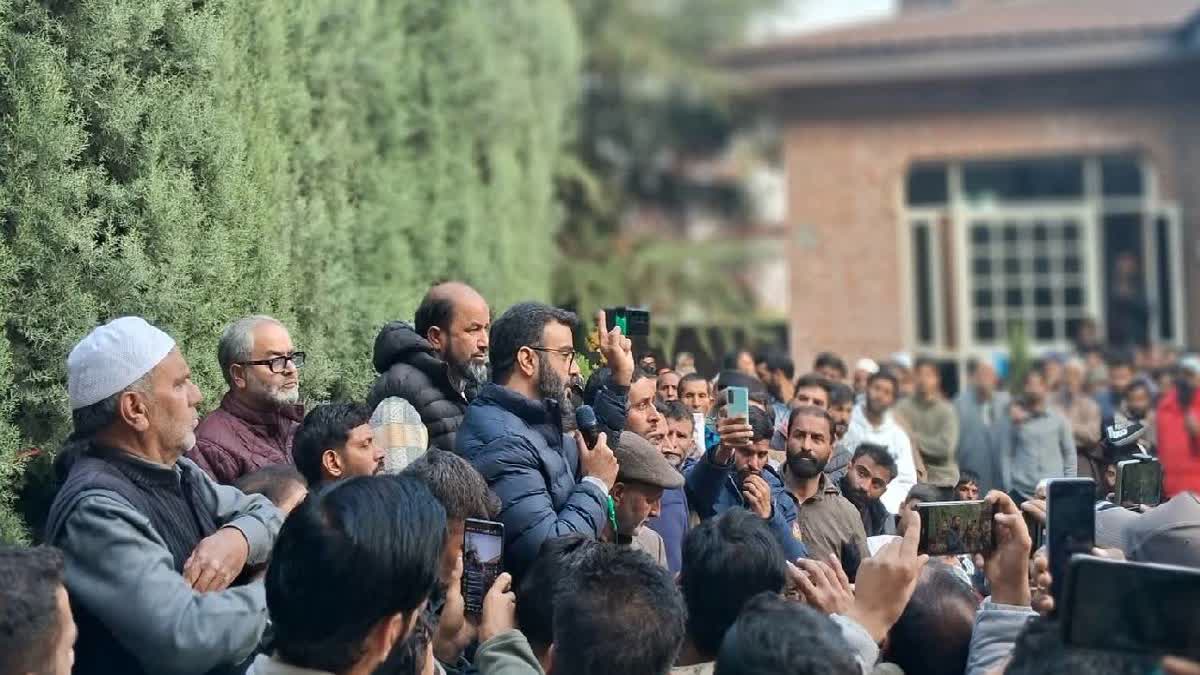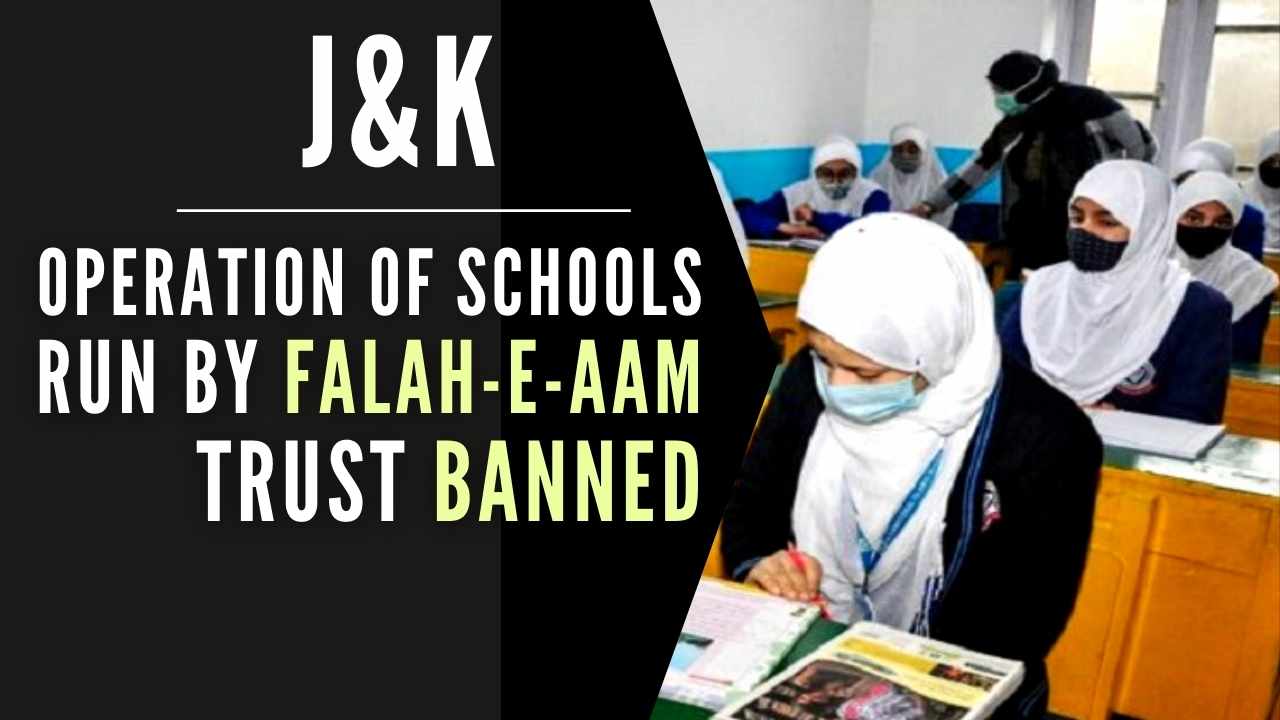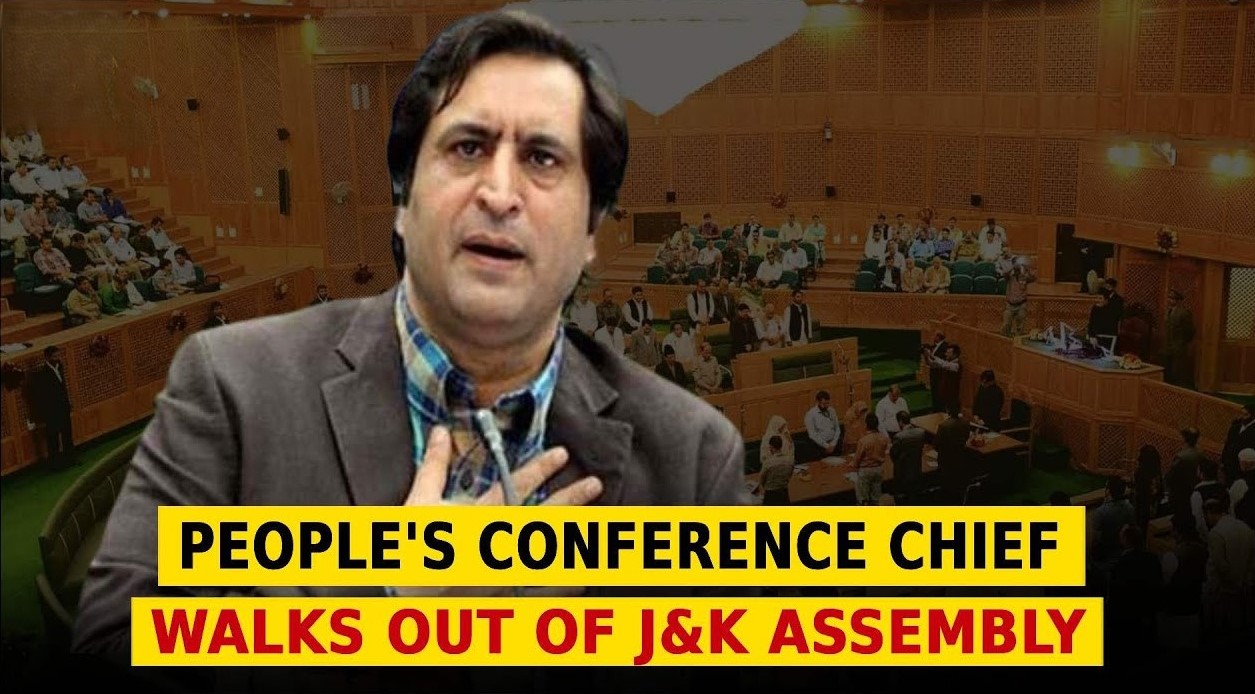MP Aga Ruhullah Mehdi has strongly rebutted CM Omar Abdullah’s claim that he committed “political suicide,” insisting that his struggle is about defending people’s rights, not chasing Assembly seats.
In a dramatic political confrontation, Aga Syed Ruhullah Mehdi, a senior National Conference (NC) leader and Member of Parliament, has forcefully rebutted Chief Minister Omar Abdullah’s charge that he committed “political suicide” by abstaining from campaigning during the Budgam bypoll. Ruhullah insists his actions were not motivated by personal ambition — he says his is a struggle rooted in principles: defending people’s rights, dignity, and justice, rather than chasing Assembly seats.
This clash is more than a personal spat. It exposes deep fissures within NC, signals a potential shift in how political actors frame their engagement in Kashmir, and carries broader implications for the political future of Budgam and the union territory at large.
In this article, we unpack what happened, why it matters, and what might come next.
What Happened: The Spark of the Dispute
01. Budgam Bypoll: A Historic Setback for NC
-
The Budgam Assembly by-election resulted in a significant loss for the National Conference (NC). The People’s Democratic Party (PDP) candidate, Aga Syed Muntazir Mehdi, won by a margin of 4,478 votes, marking an upset in what was considered an NC stronghold.
-
Budgam has long been a bastion for the NC, particularly among the Shia community.
-
This loss has triggered intense introspection within the NC leadership.
02. Omar Abdullah’s Accusation: “Political Suicide”
-
After the bypoll result, CM Omar Abdullah publicly blamed Ruhullah, saying that by not campaigning for NC’s candidate, Ruhullah “damaged himself politically.”
-
He used a pointed English proverb: “You cut your nose to spite your face,” suggesting that Ruhullah’s attempt to “send a message” backfired.
-
Omar warned that the PDP winner would not “allow Ruhullah rise again” in Budgam, casting doubt on Ruhullah’s future political relevance in the constituency.
03. Ruhullah’s Response: Principles Over Power
-
Returning from Germany, Ruhullah responded bluntly to Omar’s remarks. He dismissed the accusation of “political suicide” as trivial and “childish conversation.”
-
He insisted his fight is not for assembly seats: “I am not worried about becoming an MLA … My fight is not about power or Assembly seats.”
-
In a sharp critique, he underscored that his absence from the campaign was rooted in a refusal to support power that betrays the people.
-
He accused his party of breaking promises made during the 2024 Assembly elections, thereby betraying public trust.
-
He also used a religious-moral critique: on X (formerly Twitter), he quoted a verse from the Qur’an, calling “arrogance … a recipe for disaster. Consciousness, humility, and introspection is the way.”
Diving Deeper: What Lies Beneath the Clash
01. Ideological Rift: Local Representation vs Centralization
-
The exchange between Omar and Ruhullah reflects more than personal bitterness. It signals a clash of political philosophies within the NC. Omar’s focus seems grounded in traditional electoral power, while Ruhullah emphasizes rights-based politics.
-
Ruhullah has repeatedly criticized the NC leadership for what he perceives as a betrayal of principles: in particular, on issues like reservation, the restoration of statehood, and autonomy (e.g., Article 370).
-
According to Kashmir Life, he warned the party to “return to its true path,” calling for serious introspection and structural renewal.
02. Symbolic Political Move: Rejecting Assembly Ambition
-
By publicly rejecting the pursuit of an MLA seat, Ruhullah is making a symbolic statement. He is positioning himself not as an ambitious power-seeker but as a conscience-driven leader.
-
This may resonate strongly with constituents frustrated by “business-as-usual” politics, especially in regions where political promises have felt hollow.
-
His remark that he “refused the Union Territory Assembly in 2024” underscores his long-term commitment to a different kind of politics.
03. Moral and Religious Framing
-
Ruhullah’s use of a Qur’anic verse is not incidental. It provides a moral framework for his criticism of NC: arrogance, he argues, is spiritually and politically dangerous.
-
By doing so, he draws on his identity as a Shia leader and links political conduct to ethical values that matter deeply in his community.
-
This framing also challenges secular or transactional political debates, pushing for political humility and self-reflection at the leadership level.
04. Accountability and Governance
-
Ruhullah accuses his own party of neglecting Budgam after the 2024 elections. He says NC MLAs used “money power and arrogance” during campaigning but did not follow through on promises.
-
He warns that if the NC continues to “betray the people’s mandate,” he will not stay silent.
-
Beyond party infighting, he also criticizes the broader governance model: in his view, NC must be accountable not only to power but to public service and representation.
Broader Implications: Why This Matters for Kashmir Politics
01. Internal Fractures in the National Conference
-
The dispute reveals deep organizational tensions within NC. A public spat between the Chief Minister and a senior MP can weaken party cohesion.
-
Omar Abdullah has already called for introspection; he wants a working committee meeting to analyze the bypoll defeat.
-
If unchecked, these rifts could lead to fragmentation, defections, or even the emergence of a parallel leadership structure.
02. A Shift in Political Discourse: Rights Over Seats
-
Ruhullah’s framing of his fight as rights-based rather than seat-based could change how political engagement is viewed in the region.
-
Rather than purely transactional politics (vote-bank, patronage), his model emphasizes principled resistance, public trust, and moral accountability.
-
For voters disenchanted with traditional party politics, this could be a powerful narrative: a leader who prioritizes dignity and justice over power.
03. Voter Sentiment: A Demand for Dignity
-
The Budgam bypoll defeat for NC may reflect deeper voter frustration — not just with the party, but with what it has (or has not) delivered.
-
Ruhullah’s critique resonates with many who feel their voices have been sidelined by elites making political deals.
-
His emphasis on humility and reflection aligns with a growing demand for grounded leadership that listens, rather than imposes.
04. Future of Representation in Budgam
-
Ruhullah has raised doubts about his future in Budgam, especially after Omar’s comments that he may never stand again there.
-
But by stepping back from active contestation, he may be laying the foundation for a different kind of influence — one not tied solely to electoral office.
-
His moral authority may grow, especially if he continues to press for rights and accountability, potentially reshaping power dynamics in Budgam and beyond.
Risks, Challenges, and Criticisms
01. Skepticism Over Motives
-
Critics may argue that Ruhullah’s stance is tactical rather than ideological — that stepping back from campaigning was a calculated move to distance himself from failure.
-
Some within the NC might view his public dissent as betrayal or a threat to party unity. Omar himself has framed Ruhullah’s actions as self-harm, politically.
-
There is also the question: if he refuses seats, how will he enact change? Moral critique is powerful, but without institutional power, it may have limits.
02. Rebuilding Political Capital
-
By not campaigning, Ruhullah may have ceded ground to other leaders — particularly in Budgam, where the PDP has just won.
-
Omar’s warning that the new MLA “will never allow him to rise again” could be more than rhetoric: rebuilding influence may be hard if local power shifts.
-
If his criticism of NC leadership becomes more public, he risks isolation within his own party.
03. Governance Expectations vs Realpolitik
-
Voters drawn to his principled stand may also demand concrete results — not just words. If Ruhullah cannot translate his moral leadership into governance outcomes, legitimacy could erode.
-
Power in Kashmir is deeply contested, and systemic change (on reservation, autonomy, or statehood) is difficult given legal, political, and institutional constraints.
-
Moreover, resistance to the party line could undermine NC’s ability to function effectively if not balanced with coalition-building and pragmatism.
What Comes Next: Possible Scenarios
01. NC Introspection and Realignment
-
The NC leadership, faced with loss and internal criticism, may launch structural reforms: working committees, internal reviews, or even generational leadership changes.
-
Ruhullah could become a leading voice in shaping the party’s future direction — pushing it toward a more ethical, grassroots-based politics.
-
Alternatively, the rift could deepen, potentially leading to a splintering: if Ruhullah’s grievances are not addressed, he may become a center of opposition or reform.
02. Ruhullah’s Role as a Rights Advocate
-
Ruhullah may increasingly pivot toward being a rights advocate rather than an electoral competitor.
-
He could leverage his parliamentary position to raise issues of reservation, statehood, or justice for Kashmiris, thereby amplifying his influence beyond electoral politics.
-
By distancing himself from Assembly seat ambitions, he might strengthen his moral hand — but only if he sustains his pressure and maintains grassroots support.
03. Broader Impact on Kashmiri Politics
-
If Ruhullah’s model gains traction, other leaders in Kashmir may follow suit, prioritizing principled dissent and issue-based politics over seat accumulation.
-
Voters disillusioned with dynastic or transactional politics may increasingly support leaders who articulate long-term visions of justice, dignity, and rights.
-
The Budgam bypoll could be seen as a turning point — not just for NC, but for Kashmiri political culture: a moment when voters rewarded accountability and rebuked arrogance.
Why This Moment Matters
-
For NC’s Future: The party must decide whether to move past old hierarchies and embrace internal reforms or risk alienation from key constituencies.
-
For Kashmiri Politics: Ruhullah’s narrative challenges conventional framing: politics as service, not just competition.
-
For the People: His fight, as he frames it, is about more than power — it’s about rights, dignity, and justice. That resonates deeply in a region long marked by political disillusionment.
-
For Representation: If he stays true to his words, Ruhullah may redefine what political representation means in Kashmir — not just through elections, but through voice, advocacy, and moral leadership.
Bottom-Line
The exchange between Aga Syed Ruhullah Mehdi and Omar Abdullah is more than a personal feud — it’s a revelation of an ideological divide within one of Kashmir’s most influential parties. Omar’s accusation of “political suicide” underscores a belief in traditional power politics, while Ruhullah’s response reaffirms a vision rooted in principle, humility, and public service.
Ruhullah’s refusal to campaign, and his firm rejection of Assembly ambitions, may appear risky — but it could also herald a new model of political engagement in Kashmir: one that privileges rights over seats, conscience over ambition. Whether this proves to be a courageous turning point or a strategic misstep will depend on how both he and the NC respond in the days to come.
What is clear, however, is that this is no ordinary spat. It raises fundamental questions about the nature of politics in Kashmir, the role of leadership, and the meaning of representation in a region that has long yearned for dignity and justice.



